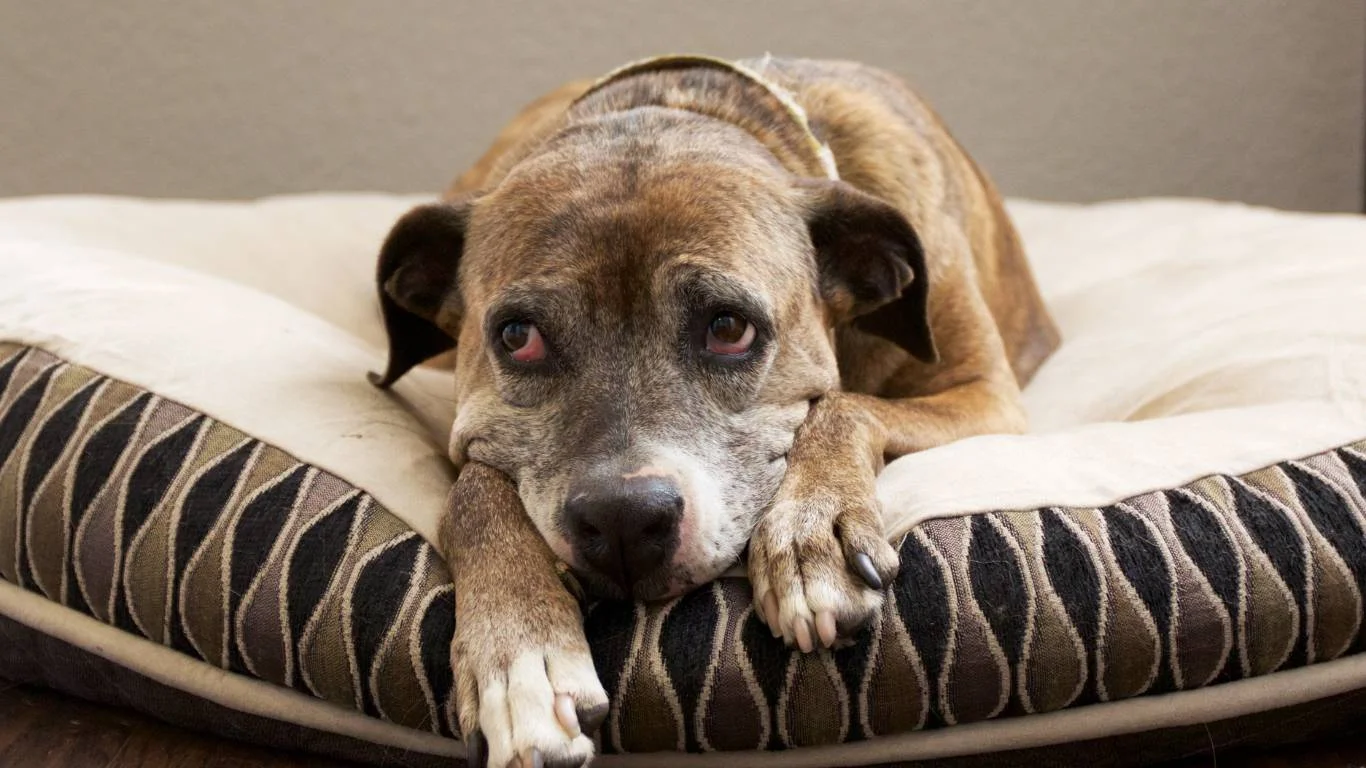What to Do If Your Dog Keeps Shaking Their Head: Quick Relief
As a pet nutritionist and care expert who has spent years in veterinary clinics, I’ve seen it all when it comes to dogs and their quirky behaviors. One thing that often sends pet parents rushing to ask for advice is when their dog keeps shaking their head. If you’ve noticed your furry friend doing this repeatedly, you may be wondering, “What’s going on?” or “Is this something serious?” Well, don’t worry—you’re not alone. Let’s dive into what might be causing the head-shaking and what steps you can take to help your dog feel better.
Understanding Why Dogs Shake Their Heads

Head-shaking in dogs is actually pretty common, but that doesn’t mean it should be ignored. In most cases, a little head shake here and there might not be a big deal—dogs shake their heads just like we might scratch an itch or stretch after a nap. However, when it becomes frequent or intense, it’s important to pay attention to what’s going on. This behavior could be your dog’s way of telling you something isn’t quite right.
Head-shaking can occur for a variety of reasons, some minor and others a bit more concerning. Let’s break down some of the main causes, so you can decide whether it’s time for a vet visit or just a case of doggy discomfort that will pass on its own.
1. Ear Infections

One of the most common causes of head-shaking in dogs is ear infections. These can be caused by bacteria, yeast, or even allergies. You’ll often notice your dog shaking their head, scratching at their ears, or pawing at them. If the ear infection is painful or severe, your dog might even tilt their head to one side.
If you suspect an ear infection, look for other symptoms like:
- Foul smell coming from the ear
- Redness or swelling inside the ear
- Excessive wax buildup
- Discharge (which could be yellow, green, or bloody)
Ear infections can be quite painful, and if left untreated, they can lead to further complications, including hearing loss. Your vet can prescribe medication or ear drops to help clear up the infection and relieve your dog’s discomfort.
2. Allergies
Just like us, dogs can suffer from allergies, and they might manifest in a number of ways—head shaking included. Whether it’s food allergies, environmental allergens like pollen, or something in their grooming products, any irritation in or around the ears can make your dog want to shake their head to relieve the discomfort.
If your dog is shaking their head and also exhibiting other allergy symptoms like sneezing, watery eyes, or excessive licking, allergies might be the culprit. In these cases, you’ll need to identify the trigger and eliminate it from their environment or adjust their diet accordingly. It’s always a good idea to consult with your vet for advice on managing your dog’s allergies.
3. Foreign Objects in the Ear

Sometimes, the cause of your dog’s head shaking could be as simple as something stuck in their ear. Dogs love to explore, and it’s not uncommon for them to get bits of dirt, grass, or even small twigs lodged in their ear canals. This can be incredibly irritating, and your dog might shake their head in an attempt to dislodge the object.
Check your dog’s ears regularly, especially after outdoor activities, to make sure there’s nothing causing them discomfort. If you find a foreign object in your dog’s ear, don’t attempt to remove it yourself. It’s best to take your dog to the vet, as improper removal could push the object further in or cause injury to the ear canal.
4. Parasites: Fleas, Ticks, and Mites
Parasites like ear mites, fleas, or ticks can also lead to head-shaking in dogs. Ear mites, in particular, are common in puppies and can cause intense itching and irritation in the ears. Ticks and fleas might also cause your dog to scratch or shake their head as they try to rid themselves of the pests.
If your dog has parasites, you may also notice other signs like:
- Excessive scratching
- Hair loss
- Red or irritated skin
- Visible fleas or ticks
Parasitic infestations need to be addressed right away. Your vet will be able to recommend the best treatment plan, whether it’s medication, topical treatments, or preventative care to avoid future infestations.
When Should You Worry About Head Shaking?
While head shaking is sometimes harmless, there are situations where it’s a sign that something more serious is going on. If your dog’s head shaking is persistent or accompanied by other concerning symptoms, it’s time to make an appointment with your vet. Some red flags to watch out for include:
- Excessive shaking that doesn’t seem to stop
- Pain or discomfort when your dog touches their ears
- Discharge or bleeding from the ear
- Changes in behavior (like lethargy or aggression)
If you notice any of these signs, don’t hesitate to contact your vet. A professional evaluation will help rule out any serious health issues and ensure your dog gets the care they need.
How to Help Your Dog If They’re Shaking Their Head

If your dog has been shaking their head a lot, it can definitely be concerning. As I mentioned earlier, it could be something minor, but when it’s persistent, it’s understandable to want to take action and get your dog some relief. The good news is, there are several things you can do at home, but knowing when to seek professional help is just as crucial. Here’s a guide on how to address the head-shaking and make sure your dog feels better.
1. Check for Ear Infections
If you suspect your dog is shaking their head due to an ear infection, the first thing you should do is check their ears. I always tell my clients, “Your dog can’t tell you what’s wrong, but their ears might.” Gently lift their ears and take a look inside. Look for signs of redness, swelling, or any unusual discharge. Smell their ears, too—if there’s a foul odor, that could be a sign of infection.
Ear infections are common in dogs, especially breeds with floppy ears, like Cocker Spaniels, Beagles, and Dachshunds. If you notice any of the symptoms of an ear infection, it’s time to contact your vet. They’ll likely need to clean your dog’s ears and may prescribe antibiotics or antifungal treatments to clear up the infection.
2. Clean Your Dog’s Ears Properly
Sometimes, the issue can be as simple as wax buildup or dirt in the ears. I’ve seen many cases where a little ear cleaning solved the problem. But don’t just reach for any cleaning solution—using the wrong products can make things worse. There are ear cleaners specifically designed for dogs, and it’s important to use one that’s gentle and safe for their ears.
To clean your dog’s ears at home, follow these steps:
- Get a vet-approved ear cleaner. Avoid using alcohol, hydrogen peroxide, or cotton swabs that could irritate the ear canal.
- Hold your dog’s ear flap gently and apply a small amount of ear cleaner to the opening of the ear canal.
- Massage the base of the ear to help distribute the cleaner inside. You’ll hear a squishing sound as you do this, which is totally normal.
- Let your dog shake their head to help dislodge the debris. Then, use a soft cotton ball or gauze to wipe away any excess cleaner and debris.
- Repeat this process as needed or as advised by your vet. Don’t overdo it, as excessive cleaning can cause irritation.
It’s important to clean your dog’s ears regularly—especially if they’re prone to ear infections or have floppy ears. However, if your dog’s head-shaking persists after cleaning, make sure to consult your vet.
3. Treat Allergies Appropriately
If allergies are the culprit behind your dog’s head shaking, you’ll need to identify the trigger. Food allergies are common in dogs, and the symptoms might not be as obvious as a rash or upset stomach. Instead, allergies can cause discomfort in the ears, leading to that pesky head shake.
Food allergies might require a little trial and error to figure out, but often, switching to a hypoallergenic diet or eliminating specific ingredients like chicken, beef, or grains can make a world of difference. I’ve seen dogs whose ear issues cleared up simply by switching to a cleaner, more sensitive food formula.
Environmental allergens like pollen, dust mites, or mold could also be irritating your dog. If you suspect environmental allergies, it’s a good idea to keep your dog indoors during high-pollen seasons or when conditions are particularly dusty. Regular baths with a gentle pet shampoo can also help remove allergens from your dog’s coat.
4. Parasite Prevention
If your dog’s head shaking is caused by parasites like ear mites, fleas, or ticks, the first step is to treat the infestation. Fleas and ticks are easily dealt with using monthly preventatives or spot-on treatments, but ear mites can be a little trickier. Ear mites are highly contagious, so if you have more than one pet, you’ll want to treat all of them to prevent the spread of the mites.
For ear mites, your vet will prescribe an ear mite treatment, often in the form of drops or ointments that you apply directly to the ear canal. Make sure to follow the instructions carefully to ensure your dog’s ears get properly treated. I’ve seen ear mites turn into a recurring problem, so using preventative treatments regularly is key to avoiding future infestations.
5. Avoid Home Remedies Without Professional Advice
It’s tempting to try home remedies you find online, but I always advise caution when it comes to your dog’s health. Things like essential oils or over-the-counter products may not be safe and can even cause harm. For example, using certain oils in or around the ear can cause chemical burns or worsen an infection. While I get that everyone wants to help their pets, it’s always best to consult with your vet before using any kind of DIY remedy.
In my years of experience, I’ve seen many pet owners make the mistake of trying “quick fixes” without understanding the full scope of their dog’s condition. A good rule of thumb is to work with your vet to create a treatment plan that’s tailored to your dog’s specific needs. That way, you can be sure you’re doing what’s best for their long-term health.
When to See a Veterinarian

There are plenty of situations where a trip to the vet is absolutely necessary. If your dog’s head shaking doesn’t improve after cleaning or treating ear infections, allergies, or parasites, it’s time for a professional to take a look. Also, if your dog’s head shaking is accompanied by signs of pain, swelling, or discharge, don’t wait. Your dog’s health is too important to leave to chance.
Other signs that you should seek veterinary care include:
- If your dog’s behavior changes significantly (like becoming lethargic or irritable)
- If your dog shows signs of discomfort when you touch their ears
- If there’s persistent or heavy discharge from the ear
- If your dog’s balance seems off, or they seem to be having trouble walking
Head shaking, while common, is not always something you should try to handle on your own. Your vet can help diagnose the exact cause and offer a tailored treatment plan to get your dog back to feeling like themselves again.
Preventing Head Shaking in Dogs: Tips and Tricks

Now that we’ve covered the causes and treatment options for head shaking, let’s talk about prevention. As a pet nutritionist and care expert, one of my favorite things is helping pet parents take proactive steps to keep their dogs healthy and comfortable. After all, prevention is always better than a cure, right?
Although some causes of head shaking, like ear infections or parasites, can’t always be fully prevented, there are plenty of things you can do to minimize the risk of these issues. Let’s dive into some helpful tips to keep your dog’s ears—and overall health—in tip-top shape.
1. Regular Ear Cleanings
One of the most effective ways to prevent ear infections and other ear-related issues is by cleaning your dog’s ears regularly. Just like we brush our teeth, we need to maintain our dogs’ ear health too. I’ve seen many dogs who rarely get their ears cleaned and end up with chronic infections, which could have been avoided with a simple cleaning routine.
For dogs with floppy ears (like Basset Hounds, Bulldogs, or Spaniels), ear cleaning is especially important since their ears trap moisture and debris more easily. However, even dogs with upright ears can benefit from an occasional cleaning, particularly if they’re prone to allergies or ear infections.
As I mentioned in Part 2, using a vet-approved ear cleaner and following a gentle cleaning routine can help remove wax buildup and reduce the chance of infections. Just be sure not to over-clean, as this can cause irritation. Once every two weeks or so is usually sufficient, but your vet can give you more personalized guidance based on your dog’s breed and health needs.
2. Use Parasite Preventatives
Keeping parasites like fleas, ticks, and ear mites under control is essential for your dog’s overall well-being. I know it can sometimes feel like a never-ending battle, especially during warmer months when parasites are more active. But consistent use of preventative treatments can go a long way in keeping these pests at bay.
Flea and tick preventatives are widely available, and your vet can help you choose the right one for your dog. Spot-on treatments, chewable pills, or flea collars are all great options to consider. If you live in an area where ticks are common, be extra diligent in checking your dog’s fur after walks or outdoor adventures. Remember, some ticks can carry diseases like Lyme disease, so it’s best to be cautious.
For ear mites, regular vet check-ups are essential, especially for puppies or dogs who have been exposed to other infected animals. Keeping your dog’s environment clean and avoiding close contact with other animals who might have ear mites can reduce the chances of an infestation.
3. Manage Allergies Effectively
As we discussed earlier, allergies are a major culprit behind head shaking in many dogs. Managing your dog’s allergies is a key part of preventing head shaking due to discomfort or irritation. There are two main types of allergies to consider: environmental and food allergies.
If your dog’s allergies are environmental, try to limit their exposure to common triggers like pollen, dust, or mold. During allergy season, consider limiting your dog’s outdoor activities or wiping down their paws after walks to remove allergens. You can also invest in air purifiers for your home to reduce allergens in the air.
Food allergies are trickier, but they can often be managed by switching to a specialized diet. Work with your vet to identify potential food sensitivities, and then transition your dog to a high-quality, hypoallergenic food that’s easy on their digestive system. In my experience, many dogs see improvements in their ear health once their food allergies are under control.
4. Regular Vet Check-Ups
Prevention doesn’t just involve what you can do at home—it also includes regular visits to the vet for routine check-ups. These visits are a great opportunity for your vet to spot any early signs of problems, like ear infections, parasites, or allergies, before they become bigger issues.
In my years of experience, I’ve seen how preventative care can save both money and stress in the long run. Your vet will be able to check your dog’s ears, skin, and overall health, offering professional advice and guidance on how to best care for them.
Even if your dog seems perfectly healthy, it’s worth getting them checked out once a year (or more often if your dog is older or has health issues). Keep in mind that many health problems are subtle and may not be immediately obvious to you, so a professional evaluation can be incredibly valuable.
What to Do If Your Dog Keeps Shaking Their Head: A Quick Recap
If your dog keeps shaking their head, it’s important to pay attention and try to figure out the root cause. From ear infections to allergies, parasites, and foreign objects, there are many potential reasons behind this behavior. Fortunately, most cases can be treated effectively with the right care and attention.
To recap:
- Check your dog’s ears regularly for signs of infection or foreign objects.
- If you suspect an ear infection or mites, consult with your vet for proper diagnosis and treatment.
- Regular ear cleanings and parasite preventatives are essential for maintaining ear health.
- Managing your dog’s allergies, whether food-related or environmental, can help reduce ear irritation and head shaking.
- Don’t hesitate to take your dog to the vet if the head shaking continues or if you notice any other concerning symptoms.
References and Further Reading
If you’re looking for more information on how to care for your dog’s ears or prevent head shaking, here are some helpful resources:
- Ear Infections in Dogs: How to Prevent and Treat Them
- Flea and Tick Prevention: Keeping Your Dog Safe
- Managing Dog Allergies: Tips and Tricks
- The Importance of Regular Vet Check-ups for Your Dog
Disclaimer
While this article provides general advice on how to care for your dog’s health, it’s important to remember that every dog is different. Always consult with your vet for personalized advice and treatment options. This article is intended for informational purposes only and is not meant to replace professional veterinary care.






